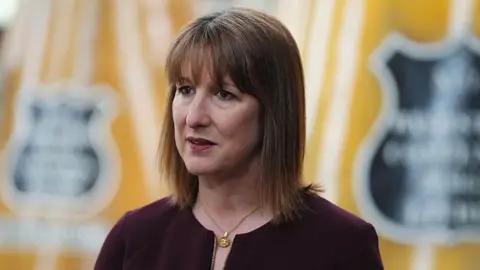Business Reporter, BBC News
 Getty Images
Getty ImagesAs the government has finalised spending plans for areas ranging from the NHS and defense to schools and the criminal justice system, tough choices are “inevitable,” think tanks warn.
The Institute for Financial Research (IFS) said it would decide whether levels of health spending have been reduced to “unprotected” areas, namely to areas outside the NHS, defense and schools.
According to IFS, funding rose sharply in 2024 due to transportation, net zero, hospitals, schools and prisons, given the government’s commitment, but that no longer increases year by year.
The government said the expenditure review on June 11 will be “scrutinized for every pound the government spends.”
This review outlines the daily department budget over the next three years and the next four investment budgets.
Whitehall insiders told the BBC they expect it to be “ugh” and the minister is fighting to win a small amount of cash in their respective divisions.
There are concerns that plans such as increasing the number of police to halve violence against women and girls may not be allocated enough cash. There is also debate over continuing funding for bus fare caps.
Prime Minister Rachel Reeves’ attitude to eliminate borrowing more money and not raising taxes will lead to strong speculative spending cuts.
Conservatives said Reeves “chosen to promote borrowing and spending to the limit,” leaving them with “impossible choices” left at first glance.
“They’re pushing up the cost of living, the unemployment rate is rising, and growth is stagnating,” said Shadow Prime Minister Mel Stride. “Even so, Rachel Reeves still clings to her tax and spending doctrine, like in the 1970s.”
IFS meant that spending would slow down as the government said it had “frontloaded” spending in the course of its parliamentary term in its first few years. “We must face the consequences of this decision,” IFS warned.
Regarding daily spending on public services, it was suggested that think tanks “rely depend on the generosity” of cash handed over to the NHS.
NHS spending is planned to be £20.2 billion between 2025 and 2026, IFS said. This allows governments to withdraw funds from other areas as they have a priority to reduce patient waiting times and improve access to dental care.
“Increasing health funds with something like historic average rates would mean imposing actual cuts on other “unprotected” sectors,” the think tank said.
He said this proves difficult, especially given the government’s ambitions to improve the criminal justice system and address prison overcrowding.
“More defence spending means being cut elsewhere.”
He added that the level of health spending is “in a sense a central trade-off in spending reviews,” and that it will only become a starker if defence spending increases even faster than is currently planned.
IFS research economist Bee Boylow said the Treasury is facing “an inevitably tough choice.”
“After turning on the spending tap last fall, the additional funding flow is set to slower until it gets even more dripping,” she said.
The government has pledged to increase spending on the Army and its estates, and announced that it will cut foreign aid budgets to increase military spending to 2.5% of national income by 2027.
“Give more to the defense, everything else equals something else, and a greater reduction,” IFS said.
In October, Reeves changed its voluntary debt rules and freed billions to spend on long-term projects such as roads and energy infrastructure, but the IF warned that “everything is not a priority for further growth.”
Civil servant: “It’s completely over-the-counter”
He said the question remained, “I don’t want a trade-off, but about whether I will face it?”
Jewelry designer and business owner Kiki McDonough said on Sunday that he believes the public sector can save money during the Laura Quensberg program.
“The civil servants to me are completely unmanned and not functioning properly. I think I could have found a lot of savings if I went through it like salt and tried to find savings,” she said.
McDonough criticized the prime minister’s decision to increase the amount that employers pay in national insurance, saying her initial budget is “like someone throwing confusion at us.”
Simon Case, former head of civil servants, admitted that he had “completely failed” in his time as Cabinet Secretary in order to reduce the size of the organization.
“I was supposed to reduce the size of civil servants, but it actually went up,” he told the program.
“It is undoubtedly true that we can find a more efficient and effective way in all public services.”
To continue to improve public services under strict constraints, IFS suggests that governments can improve productivity, allowing it to provide the same or better services within a lower budget.
But that’s a challenge. ONS reports that public services productivity is currently below pre-Covid pandemic levels in 2024.
A government spokesperson said, “We deliver what’s important to workers — reducing hospital waiting lists, controlling borders, and working on living expenses.”
Keeping your pay flat is “substantial challenges” as IFS’ choice to cut public sector salaries has led to recent past strikes.
They concluded that reducing public services is not impossible, but challenging and requires “ruthless prioritization.”
